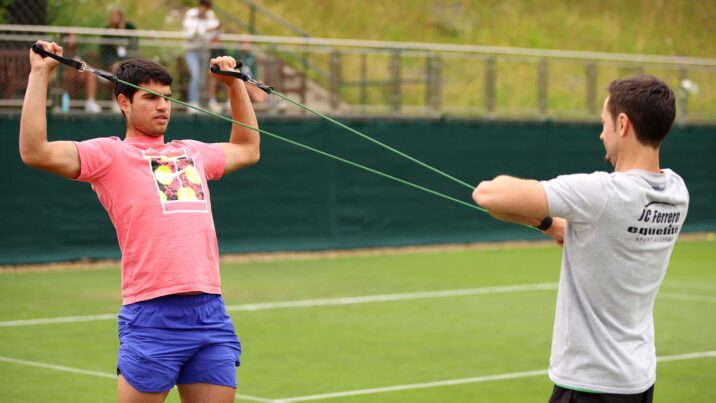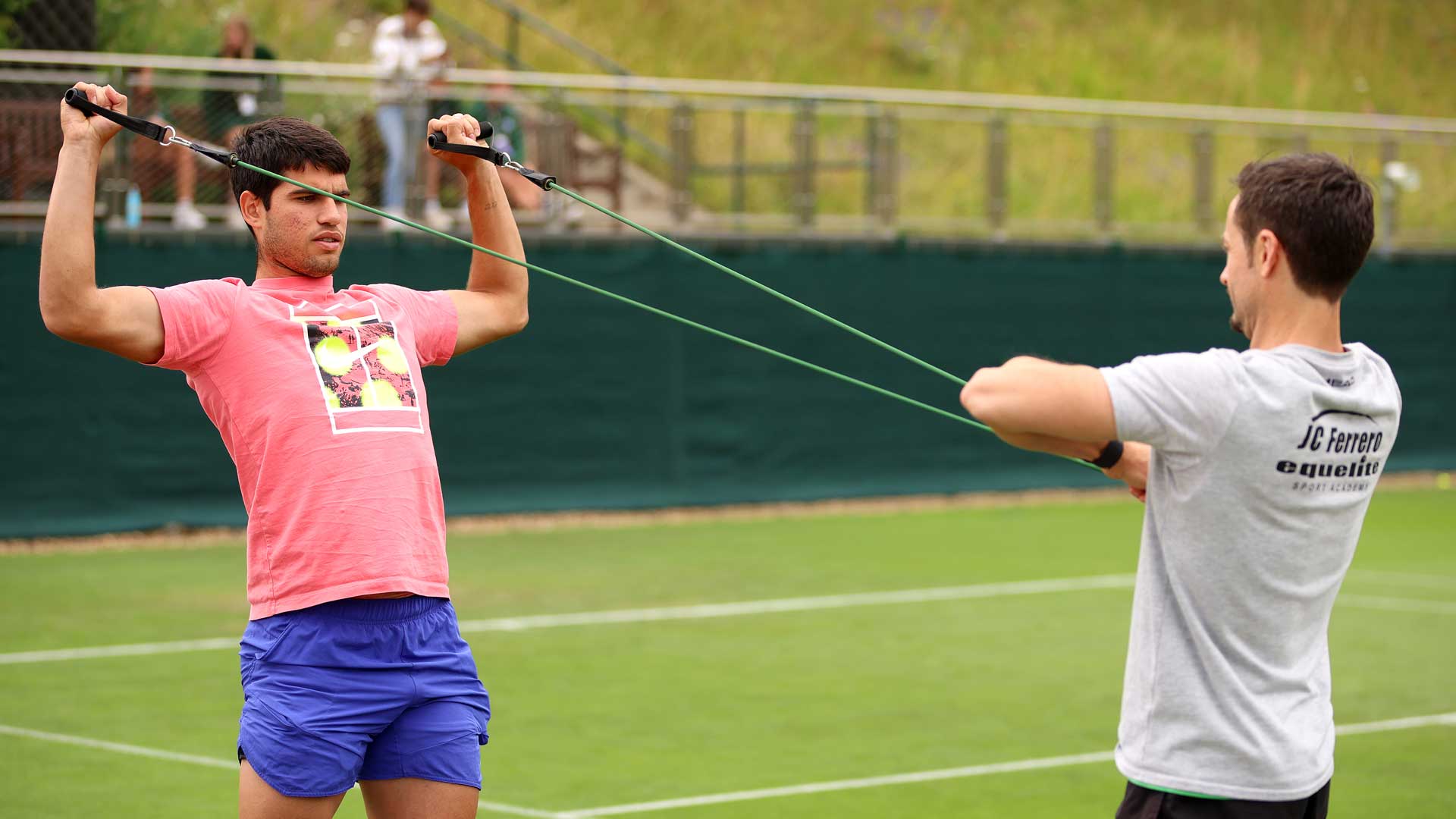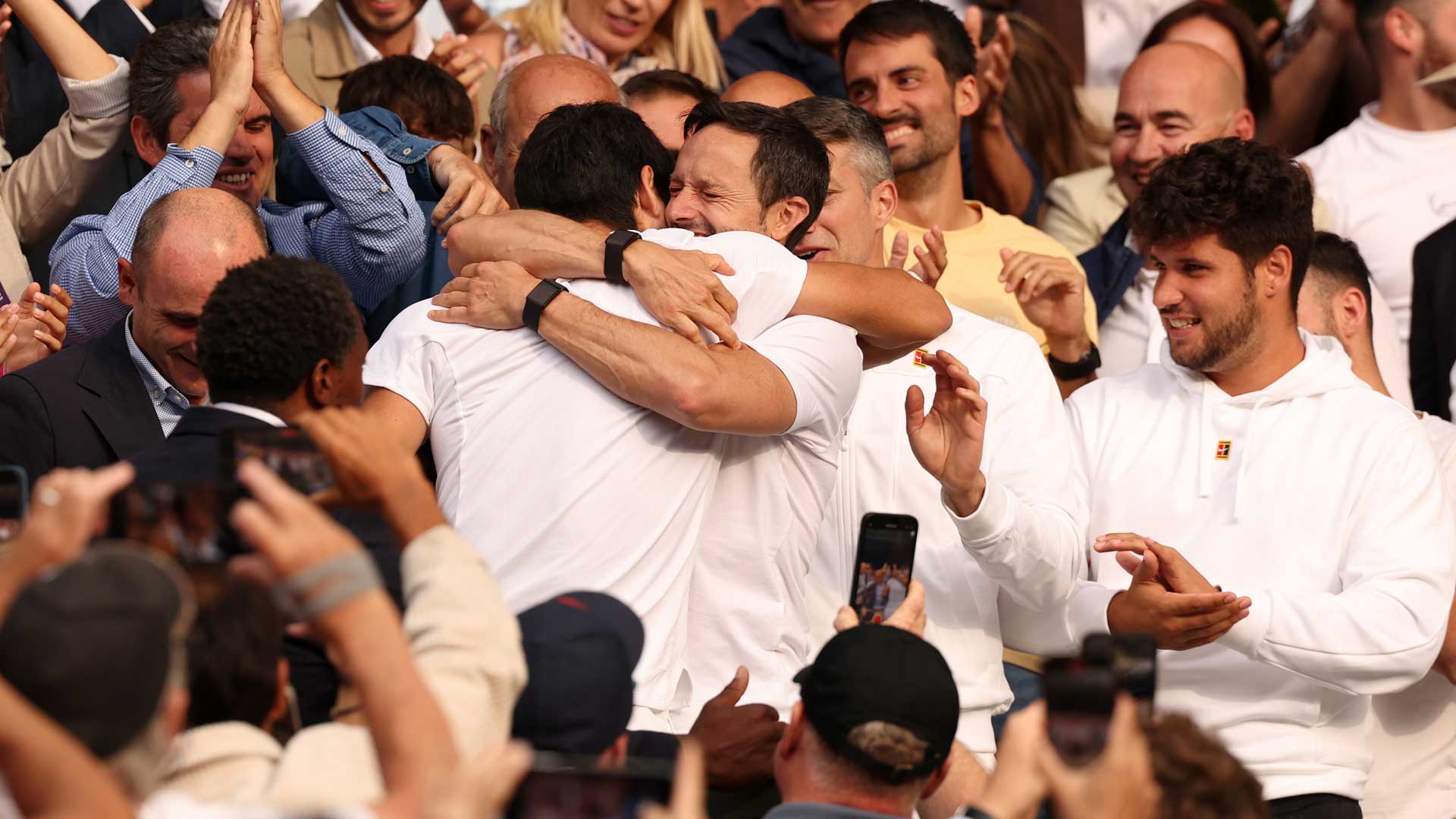
This story was translated from ATPTour.com/es.
Among Carlos Alcaraz’s vast array of sporting weapons, there is one that is invisible to the TV cameras. It is a virtue that may go unnoticed by the fans as they witness his progress through a life dedicated to tennis, and one that has enabled him to enjoy a rapid rise on the tour, putting him a cut above the rest at just 20 years of age.
Carlos absorbs the admiration of the masses with an extraordinary ability to learn, channelling every experience into his own personal growth.
The Murcia native is the new Wimbledon champion, the holder of one of the most prestigious trophies in all of sport, and with barely any experience on grass courts. He has won two of the first 10 Grand Slams in which he’s played, and has already achieved more than most do in their entire careers. Already at the pinnacle of tennis, he is the youngest player ever to climb to the top of the Pepperstone ATP Rankings.
While the man of the moment attempts to comprehend his historic achievement, his physio and rehab specialist Juanjo Moreno, who is largely responsible for Alcaraz’s fitness, spoke to ATPTour.com about the current World No. 1’s strengths.
[ATP APP]
Carlos arrived at Queen’s having played two tournaments on grass in his entire life. How did the team help put him in a position to win the tournament?
It’s a question that I’m often asked, not only by the press, but also other people in daily life and even professional colleagues. Managing to adapt in such a short space of time is difficult. It’s difficult for Carlos, for his team and for any athlete.
Science has shown that there are specific times in which physiological adaptations occur in all the systems that make up a sportsman. That adaptation very often doesn’t happen in the time the players have to change from one surface to another.
And grass really changes those dynamics…
Even though clay and hard court are different, the type of movement and stopping are similar, although there are some changes. But on grass everything changes even more. Carlos isn’t a player who slides on grass, for example, so all those types of small changes are very difficult. It’s very demanding on the muscles and joints, in fact for the entire physiology required by an athlete’s body.
Just as it’s difficult for him, it’s also a challenge for his team. Often we feel like we don’t have the time we’d like to have to be able to prepare for this surface and avoid injuries.
Alcaraz and Moreno at Wimbledon. Photo by Clive Brunskill/Getty Images.
Were you surprised at what you achieved?
If we weren’t surprised, we wouldn’t be human. As Carlos Alcaraz’s team, captained by Juan Carlos Ferrero, our targets and goals couldn’t be bigger. When we prepare Carlos for any competition it is for him to win. As a team there is no other goal in our head that is not winning the tournament we are entering. Also avoiding injuries, if possible, which is the biggest concern for the technical staff, being aware that achieving sporting results or performances can often come at the cost of caring for the body. But that’s high-performance sport and we accept the challenge.
To us it’s surprising from a certain point of view, but from another the result achieved by Carlos was also to be expected. We prepare to win every competition we enter, therefore we try to choose carefully which ones we go to. If we managed to win Queen’s and Wimbledon with such a short period of adaptation to the surface, of course it’s surprising. Surprising from the point of view of a huge historic achievement, but not because we weren’t expecting it. Really, we were expecting to win it and that’s what we work for every day.
In Paris he suffered from cramps. In London he lasted until the end. Carlos attributes that to his mind.
Together with his manager Albert Molina and Ferrero, we’re the people who spend the longest at his side. I’m available to him 24/7, 365 days a year. We know him very well and we know that all the physical work was done. We were aware that he was ready on a nutritional level, with all the necessary minerals and salts. When you get a bout of cramp like the one that happened to him, there are people that think maybe the formula wasn’t right. But we weren’t worried at all from a physiological point of view.
Then, the psychological side is very important. I can prepare Carlos any salt supplement or a similar drink to prevent cramps, but it’s difficult to get inside his mind.
In his press conference he explained very well the reason those cramps happened, pointing to more of a mental issue than a physical one. It’s always extrapolated into different fields, but in this case the most significant factor was psychological. Carlos is a sportsman who learns very quickly from what has happened. When the match finished he also asked questions about why it happened and we talked about it as a team. He is told what the reason is, he understands perfectly and learns from the experience. With this information and with the work he does with his psychologist Isabel Balaguer, also a member of his team, Carlos has been able to learn and overcome the situation.
At Wimbledon there were no signs of that problem.
We knew that it was a match with similar pressure to the one at Roland Garros, or greater, because it was the final at Wimbledon. We were aware that the match would be difficult, that Djokovic wasn’t going to make things easy. As the match progressed, as one of the main people responsible for that area, I was getting a little nervous thinking that the cramps might come back. But I also trusted in Carlos’ capacity to learn. I was also calm, in part. I knew that my work was done, that Carlos had taken the same [physical and nutritional preparations] as he took at Roland Garros and I was confident things would go well. If he had learned from what happened in Paris, as he demonstrated, those cramps wouldn’t happen.
At Roland Garros those cramps came around two hours into the match. At Wimbledon he played for almost five hours and the cramps didn’t appear. That shows that Carlos is an athlete who learns very quickly from his experiences. Roland Garros is a very important tournament for him and it demands a little more of him than other tournaments, knowing that you’re playing the best of five sets. He overcame that challenge at Wimbledon and, as he said, the origin of that situation was more his nervous system than physiological and the data proves it. He won Wimbledon, he held on to No. 1 and he did it based on the experience he had at Roland Garros with Djokovic.
One of our team’s mantras is that there is no defeat without learnings. Carlos is one of the best at that.
Alcaraz hugs Moreno after winning the Wimbledon title. Photo by Julian Finney/Getty Images.
Djokovic stated that he had never competed against a player like him. And he underlined his longevity.
It is special to hear such amazing words from a sportsman like Novak Djokovic, a legend of tennis. His opinion is very respectable and I’m proud that he would say something like that about my athlete.
But in terms of longevity, it’s very complicated. Tennis is a very physically demanding discipline; it’s unusual for a tennis player not to go through injuries. There’s little time to adapt, the calendar is demanding and you never know in terms of planning how long a match will last. I can do calculations but it’s impossible to know until the match is over. At a Grand Slam you can play everything in less than three hours, but then you can actually end up playing for over five hours.
In that regard it’s a very demanding sport, along with other realities like the type of balls. Some are very hard, you have to take into account the material they’re made from… There are many risk factors, as we physios and fitness coaches would say. There are too many variables for picking up an injury to be able to calculate a sportsman’s longevity.
In athletics, probably, the track will always be the same over the next decade. But in tennis over the next 10 years the surface will require us to compete on grass, clay and hard courts every season. There will be ball changes, different atmospheric and meteorological conditions… The range of factors is too wide to make a prediction like that of Djokovic.
I would love for all the work we do with Carlos to give us a sportsman with a long career. We’re working hard to take care of his body and prolong his sporting life as long as possible.


